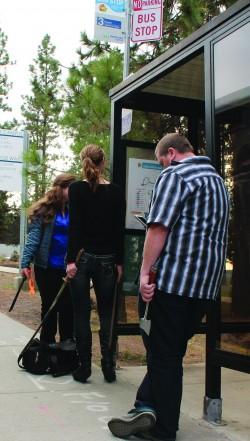
Where Oregon State University has three pages of weapons policy, Central Oregon Community College has one. Is that enough? Do students know what the weapons policy is? A task force of faculty, staff and students has been assigned to find out.
Restricting use of firearms on campus isn’t unconstitutional, according to Seth Elliot, director of Campus Public Safety at COCC and a member of the task force.
“We’re a special district,” Elliot said. “We do have the right, just like the Oregon University system, to control some activities on our premises. …Just like a movie theater can say ‘no guns.’”
A policy of open-carry firearms would negatively affect the learning environment, according to Sharla Andresen, director of risk management at COCC and task force chairman.
“I’ve been here 22 years and it’s always been the same. …People need to be able to express themselves,” Andresen said. “Some students are very uncomfortable seeing another student with a weapon.”
Right now, the weapons policy covers firearms, explosive, ammunition and fireworks but doesn’t address other weapons like knives, according to Elliot.
The task force consists of staff members, like Gordon Price, director of student life, faculty, such as Kathy McCabe, head of the criminal justice program, and even Basevi Adamo, a student and assistant resident director at Juniper residence hall.
“We wanted the best opinions and views of the entire campus,” Andresen said. “We’ve gathered someone from everywhere. …We’re all there with open minds. We want to make sure the policy is strong.”
To ensure that the weapons policy be as strong as possible, the task force is also involving legal counsel and employing data from a survey given to faculty and students.
It’s very possible that the problem is not the policy itself, but that students don’t know what the policy is, according to Andresen. This concern was what, originally, gave birth to the realization of a need for a task force.
“This task force emerged from faculty interest regarding signage,” Elliot said. “Having signs around campus advertising the policy… would help students, staff and responding law enforcement. …Maybe our work won’t be editing the policy but advertising the policy.”
These questions are the reason the task force is at the “fact-finding phase,” according to Andresen.
“If people know there’s a policy but don’t know what to do with the policy, we need to figure out how to get that policy out,” Andresen said.
At the end of the term, the task force will report to Student Affairs with info and their recommendation for moving forward, and Student Affairs will then decide how to proceed.
Scott Greenstone
The Broadside













